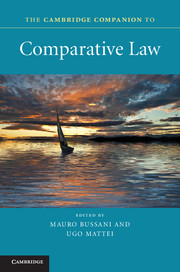Book contents
- Frontmatter
- Contents
- Contributors
- Abbreviations
- Preface
- Part I Knowing comparative law
- 1 Comparative law and neighbouring disciplines
- 2 Political ideology and comparative law
- 3 Economic analysis and comparative law
- 4 Comparative law and anthropology
- 5 Comparative law and language
- Part II Comparative law fields
- Part III Comparative law in the flux of civilizations
- Index
- References
2 - Political ideology and comparative law
Published online by Cambridge University Press: 05 May 2013
- Frontmatter
- Contents
- Contributors
- Abbreviations
- Preface
- Part I Knowing comparative law
- 1 Comparative law and neighbouring disciplines
- 2 Political ideology and comparative law
- 3 Economic analysis and comparative law
- 4 Comparative law and anthropology
- 5 Comparative law and language
- Part II Comparative law fields
- Part III Comparative law in the flux of civilizations
- Index
- References
Summary
Introduction
In the first half of the nineteenth century, the historical school usefully and also abusively derived legal difference from differences in national culture and national history. Towards the end of the century, it was common to understand systems as flowing in their details from a large conceptual characteristic (for example, codified versus common law; place on the evolutionary spectrum running from status to contract; formal rationality versus qadi justice). In the next period, the dominant mode was to understand systems as having adopted varied solutions to common functional problems.
These methodologies of comparison are related to the juristic methodologies of their times. Weber’s typology of modes of legal rationality, with German pandectism at the top, was a manifestation of the classical legal thought that was declining as he wrote. The functionalist method is patently consonant with the emergence of social legal thought, whose slogan was that law is a means to social ends and whose juristic method was teleological.
In contemporary legal thought, ‘balancing’ or ‘proportionality’ is a prevalent legal methodology. Is there an equivalent comparative methodology? A preliminary answer would be that one way to understand any particular difference between two contemporary legal systems is as the product of different balances between conflicting considerations, be they principles or policies, rights, powers, or whatever.
- Type
- Chapter
- Information
- The Cambridge Companion to Comparative Law , pp. 35 - 56Publisher: Cambridge University PressPrint publication year: 2012
References
- 9
- Cited by

